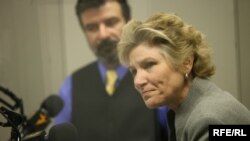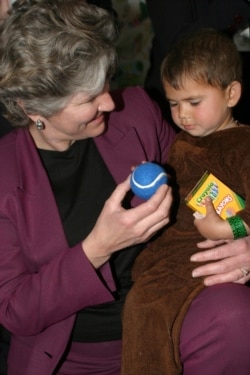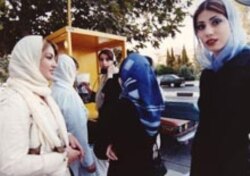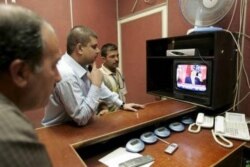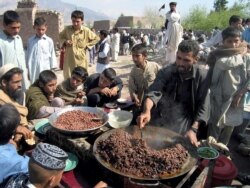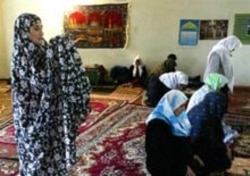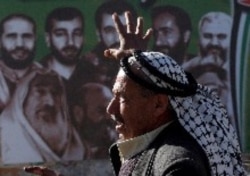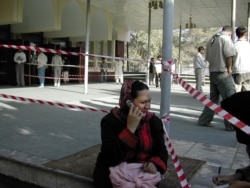Listen to the complete interview (about 27 minutes):
Real Audio Windows Media
RFE/RL: As underscretary of state for public affairs and public diplomacy, what are the main opportunities and challenges you are facing in fulfilling your mission?
Karen Hughes: I really view my job and the way I describe it in simple terms is [that] I'm focusing on America's conversation with the world. And I say "conversation" because I think sometimes the world thinks we speak at them, rather than listening to them. So I've tried to focus a great deal on listening and engaging in dialogue.
And as I travel the countries I try to meet with people. I meet with a wide sector of people, young professionals, people in low-income neighborhoods. Many people have told me that I've gone places where an American has never gone before. I try to appear on television shows where they've never interviewed an American before, to really reach out. The core of public diplomacy is, I believe, people-to-people programs and exchanges and ways that we can actually reach out to people.
I have three strategic goals for the way I look at, the way I constantly ask my staff to look at, our public-diplomacy efforts and I'll just go through them all quickly. The first is I believe it's very important that America continue to offer the world a positive vision of hope and opportunity that’s rooted in our values, our belief in freedom, our commitment to human rights, our belief in the worth and dignity and equality and value of every single person in the world. I saw a focus-group interview [with] a young man in Morocco and he said: "For me, America represents the hope of a better life." And I think it's vitally important that our country continue to offer that hope to people everywhere, whether it's people in Afghanistan, or Uzbekistan, or Iran -- that we've got to offer that hope that’s rooted in our fundamental values again. The most fundamental of all is that we believe every person matters, every person counts, and every person has the right to live a life that’s meaningful and to contribute.
A second strategic imperative is to work to isolate and marginalize the violent extremists and to undermine their efforts to impose their vision of ideology and tyranny on the rest of us. And so we work very hard to encourage interfaith dialogue, to talk about the fact that we think people of all faiths share certain beliefs -- in the value of human life, for example. And the violent extremists obviously don't value human life -- they've targeted innocents and committed horrible crimes against innocent civilians across the world. So I think it's very important that we, as a world community, as an international community, draw a very clear contrast between our vision -- which is for education and openness and tolerance and inclusiveness -- and the extremist vision, which is a very narrow, rigid ideology. Essentially they say, "You have to agree with us, or we want to kill you." And so it's very important that we draw that distinction in very stark terms.
And the final strategic imperative is that I believe it's very important for America to foster a climate of common interests and common values between Americans and people of different countries and cultures and faiths across the world. And that's particularly important at this time when we are engaged in a worldwide war against terror. One of our former ambassadors, when I met with him, said to me: "Karen, you know, American foreign policy can't be just seen as focusing on common threats. We have to focus on common interests and common values." And I find as I travel the world we do have a lot in common, even though we don't always recognize that. If you ask a lot of people around the world "what's most important to you," frequently they’ll say their faith, their family, their sense of social justice and responsibility. If you ask Americans "what's most important to you," we'll say "our faith, our family, our communities." Often, though, if you ask the people in other parts of the world "do you think Americans value faith and family," they don't understand that about us. So I think it's very important that we talk and engage in dialogue so that we understand that we do have a lot in common.
I'm a mother. I have a son who I love dearly and a daughter, and I want the best for them. I want them to be educated; I want them to have a chance to travel around the world and meet other people; I want them to grow up and have an opportunity for a job and a productive, meaningful life. And that's what parents across the world want for our children. And so I think it's very important that we reach out in that spirit to the rest of the world.
RFE/RL: You just spoke about the importance of having a dialog between the United States and the Muslim world. Do you see a role that international broadcasters could play in that dialogue?
Hughes: Absolutely. I'm here at Radio Free Europe/Radio Liberty and I was just told that of the 28 countries where you broadcast, I think, 18 have majority Muslim populations. And so that's a very important voice for our values going into those countries. Your mission here is to provide the truth and to provide audiences in those countries with information that is accurate. One of the challenges, I think, that I face in my job, one of the things I say, is that I want people to be able to decide for themselves. And I think that's very different from the extremists that we face. The extremists want a very narrow, rigid view of the world. They basically say, "it's our way, or you're wrong."
We want people to decide for themselves, and I think that's a very powerful point, particularly for young people. Young people want to learn; they want to make up their own minds; they want to explore; they want to hear a variety of news and information. And broadcasting helps provide that credible source of news and information, often in countries whose governments control the news or control information about what is happening within their own borders. So your service provides open information and an opportunity for young people to decide for themselves.
Another big part of my strategy is to try to empower our own citizens. We have in America 6-7 million Muslim-Americans, and I believe they are a very important bridge to the wider Muslim, Islamic world because many of them are from cultures around the world, came from those countries, and so know both cultures, know both their home culture and their now American home culture. And so I think they are an important bridge.
I was in Germany not too long ago, and I was meeting with a group of Muslims who live there and this woman was telling me how isolated her community is. And I said, "Well, could I come meet and maybe talk with people in your community?" And she looked at me and kind of shook her head and said: "No, not really." I was kind of taken aback and I said, "What do you mean?" And she said, "Well, we wouldn't want our own government officials to come and meet with us, so why would we want yours?" Because there is such a hostility, a sort of disconnect, the community feels very isolated there. And I said, "what if I sent a group of Muslim-American citizens over here to meet and talk with you?" And she said, "that'd be great!"
And so, beginning next week, we're going to be sending Muslim-Americans to different regions of the world to meet with Muslim communities and begin a dialogue. And so I think one of my roles is to help empower those voices and to let Muslim communities across the world hear different points of view and hear debates, and I know that's one of the things that our broadcasting encourages is: "Let's look at...." [and] "We've got to talk about...."
We have in America separation of church and state, but that doesn't mean -- I think I'm worried that sometimes freedom of religion has come to mean freedom from religion. And I don't think that's what was intended. America has people of many different faiths -- Muslims work and worship and practice their faith very freely in my country. And so do many Jewish citizens. So do many Christian citizens of all different denominations. And some Americans choose to practice no faith at all, and that's fine too. So we have a very diverse and tolerant society. And I think it's important that we allow and, through our broadcasting, that we allow discussion of these kinds of issues.
RFE/RL: There are countries in the world that you can visit, where you can talk directly to people. But there are countries, like Iran, that are much more difficult to visit. Do you have different strategies for communicating with people in more isolated societies?
Hughes: That's where broadcasting [into Iran] becomes even more important, because Radio Farda does reach an audience that we're not able to reach. President Bush has recently requested supplemental funding for additional broadcasting into Iran and also for an opportunity to try to begin some people-to-people exchange programs, where we could begin to try to have some exchanges. That's going to be difficult and we recognize that.
So our broadcasting becomes very important in terms of being able to establish a dialogue, and some of the correspondents here were sharing with me that you hear from many of your listeners within Iran, that they would call and leave messages or they would send e-mails. I think that's a very important dialogue.
We, of course, have many Iranians in America and they are in touch with people in Iran. For example, recently, I reached out to them and had conference calls with them to get their points of view about events in Iran and how we might better engage with the people of Iran. But clearly it's a problem.
In societies such as Cuba, for example, as well. Again we try to broadcast into Cuba, but we don't have formal relations, therefore we don't have formal exchanges. We, again, have a lot of Cuban-Americans who communicate to some extent with family back at home. So we have to adapt our strategies to each country. By and large, however, I think that in today's world, it's very different than public diplomacy was in the Cold War. In the Cold War, as you know because Radio Free Europe/Radio Liberty was such a vital part of it, we were broadcasting news and information into societies that were largely closed, that were hungry for that information. That's still the case in Iran today, or in places like Cuba.
However, in much of the world -- particularly across much of the Middle East, for example -- there's no longer an information deficit. In fact there is an explosion of information, and it's a completely different world that we're dealing with because a lot of it is propaganda, a lot of it is not true, a lot of it is rumor and myth and it goes around the world instantly on the Internet. I remember one of the great ironies that I saw recently of the modern communications age was when one of Saddam Hussein's ministers -- the minister of information -- was standing outside Baghdad, saying that American troops weren't there [while] you could see on your television screen that, yes in fact they were, and you could see Baghdad in the background.
And so today, in today's world, when we see on our television stations pictures from around the world in an instant what we're vying for, I think, is attention and credibility in the midst of an often-crowded communications environment and that's why it is so important, I think, that our broadcasting is committed to telling the truth and to portraying truthful, accurate information without bias, without propaganda, without slant, but providing the truth to people across the world.
RFE/RL: You earlier indicated that you have made several trips to Afghanistan and you are a good friend of the Afghans, especially the women. Are there any concerns about what seems to be a deteriorating situation in Afghanistan with advances by the Taliban and especially the anti-U.S. rioting that took place recently? And you are also welcome to make any statement for Afghan listeners.
Hughes: Well, thank you so much. Afghanistan stole my heart on my first visit to Afghanistan several years ago. I was so impressed by the great courage, particularly of the women there who have been through so much after years of war and years of the Taliban rule. Yet I met women who, despite threats of really their life in some cases, were having home reading classes to teach little girls to read because little girls were forbidden from going to school or learning to read. And I met women who just had so much courage, who had lost husbands at war and yet had been struggling to try to support their families.
Of course, everywhere I went, the people were so gracious, so warm. You’d meet people who had virtually nothing and yet they would offer you everything. They’d invite you to their home, and serve you tea and greet you with great warmth. I really admire the courage of the people of Afghanistan.
And I found when I was in Afghanistan that the people of Afghanistan were very grateful. Everywhere I went, they said two things to me. They said: “Tashakkour” -- “Thank you.” And then they said “don’t leave,” because they very much want a chance at peace and stability.
I think what we are seeing now is some Taliban remnants try to take advantage of a situation there as NATO takes the lead of the operations for the coalition there. I think we are seeing increased presence of NATO in the southern part of Afghanistan, and so we are encountering some Taliban forces that we had not encountered before because we hadn’t had that kind of presence in the southern part of the country.
I saw the American ambassador to Afghanistan interviewed about the riots. He said he thought it was more of a crowd that got out of control, and was just sort of in a very ugly, feisty bad crowd dynamics. Because he said his experience is still by and large the same as mine, and that is that the majority of the Afghan people want the presence of American forces and coalition and NATO forces in Afghanistan, because they know that is the best hope to have peace and prosperity in their future.
I am looking forward to going back to Afghanistan. I again think the people there very much want.... They are very entrepreneurial. I remember seeing, I would see piles of rubble from the destruction of war and then every few feet the bricks had been cleaned up and someone had put up a sign and they were going into business. I think that’s a very moving tribute to the spirit and the character of the Afghan people.
We are committed to Afghanistan. America is committed to Afghanistan. NATO is committed to Afghanistan. And we want Afghanistan to succeed. It’s fairly exciting that we have a democratically elected government there. I had the privilege of attending President [Hamid] Karzai’s inaugural and watching the Supreme Court under the new constitution administer the oath of office to the new president, the chief justice. I couldn’t help but think, you know, two years ago none of this was here. There wasn't a constitution; there wasn't an elected president; there wasn’t.... Now we have a parliament with a number of women in parliament. I am looking forward to visiting with some of them on my next trip to Afghanistan.
RFE/RL: There seems to be a problem between two important allies in the war against terrorism -- Pakistan and Afghanistan. Using your status in the administration in promoting communication and dialogue, can you influence this? Can you do anything about it?
Hughes: Well, I certainly hope I can. I’ve been to both countries. I was in Pakistan not too long ago. I led a group of business leaders to Pakistan to help raise money for recovery from the horrible [October 2005] earthquake there.
I am aware that there are tensions and, unfortunately, there are some very difficult regions along the border between the [two] countries. Americans ask me all the time, why haven’t we caught [Al-Qaeda leader] Osama Bin Laden if he is there? I have flown over that country. As you know, it is extremely rugged. It’s hard to imagine. I remember flying over some of those mountains and thinking there is no way anyone could live there. And then they had put me on night-vision goggles and I looked down and there were hundreds of fires where people had campfires, where people were living all throughout those mountains and they go for miles and miles, and it was incredibly rugged and incredibly hostile territory and incredibly difficult to imagine. And of course, [there are] long traditions and long grievances. So it’s difficult. But I certainly hope that America, our government could in some way perhaps encourage better relations.
RFE/RL: You have spoken about the importance of faith, at least of telling the world that Americans are people of faith. How important is sensitivity to religious issues in your communications strategy, especially sensitivity to Islam? And would you talk a little bit about the role of this interfaith dialogue you have been active in? How that is involved in your strategy?
Hughes: I think it is absolutely vital, because as a communicator I understand that the way that you really communicate with people is that you have to speak in ways that are relevant to their lives. And so if you are speaking with someone whose faith is the most important thing in their life, which it is for many people across our world, you can’t just ignore that factor.
I was one of the people who advocated that the president visit the mosque in the aftermath of [the] September 11[, 2001, terrorist attacks in New York and Washington] to send a signal that we understood that we have many Muslims in America who are very peaceful citizens, who are proud Americans, and that this was not about the faith of Islam, but this was about some people who were violent extremists, who were trying to use the cloak of religion to try to cover acts that were really acts of murder. So I was an advocate of that, and I think it’s very important that we show the world that America is a very tolerant and diverse society where people are welcome to practice their faith.
It’s interesting, I was in Morocco last week and I was talking with a couple of people who had been on exchanges and I asked them what their feeling was in America. And they said they felt so free -- they couldn’t believe how free they felt. A woman who wore cover told me how sometimes when she travels to Europe and other places, she feels as if people stare at her and look at her as is she is a little different or a little suspect. And yet she said in America she felt totally free, and she didn’t have that feeling in America. Because we are a very diverse and very welcoming country and society.
And I think it is important that we seek to foster interfaith dialog and that’s one of the things that President Bush asked me when I took this job. He said, "meet with religious leaders, foster conversations among religious leaders." I’ve attended a number of interfaith conferences. Because again you have to recognize that faith is very important to many people’s lives. So if you exclude that from your conversation, you are excluding something that is very important to many people.
The other thing is that the world’s major faiths have many things in common. The world's major faiths all believe that we should try to live in peace and love for each other, that we should love God and love our neighbor. All believe and teach that life is precious and that the taking of innocent life is wrong. It’s important that we talk about these things. Sure, we have differences. We have important theological differences. But we also have much in common. And I think it is very important that we foster that kind of dialogue.
RFE/RL: The United States has been accused of having allies that are undemocratic even as America promotes democracy and freedom. How do you answer critics who charge that the United States preaches one thing but practices another?
Hughes: President Bush made it very clear in his second inaugural address that he felt that America had to stand for freedom everywhere in the world and that, in the aftermath of September 11, America had reevaluated our national security, had looked at the situation around the world and had realized that when you have regions where there is a freedom deficit, then you often have the kind of conditions that can be taken advantage of. You have a kind of hopelessness, you have a sense of simmering anger that can lead people to get on airplanes and do crazy things like flying them in the buildings full of innocent people. He recognized that we had to address that.
So in the aftermath of September 11, the president made it our policy to foster freedom everywhere, to foster democracy, to encourage the democratic aspirations of people, because -- again -- we feel that’s in our national interests as well as in their interests. He said we have no monopoly on freedom in America. We believe that men and women were endowed by their creator with certain rights, as our Declaration [of Independence] says, and among them are the rights to life, liberty, and the pursuit of happiness -- in other words, to freedom. And so we have an obligation to stand for that everywhere. He also said we recognize that will come in different ways in different places, and that the pace of change will be different in different places.
For example, in some place like Egypt, we spoke up and commended the step of having a multiparty presidential election. I remember being in Egypt and talking with a young man -- he was not much older than my son -- and he had just voted for the first time in the presidential election and I said, “did you have a choice of candidates?” And he said “yes.” And that was the first time that there had been a choice like that.
Then they had parliamentary elections that were not as open and not as free. And we expressed our concerns about that. So when there are crackdowns against people who are trying to peacefully exercise their right to speak out, we will speak up and say that we disagree with that.
Again, we recognize that the pace of change will be different in different places. There will be slow steps in some places. In other places, there will be bigger steps. But what we are seeing across the world, we hope, and what we are trying to encourage, is the advance, greater liberties, greater freedoms.
The women of Kuwait, for example, now have the right to vote and the right to run for office. So we are seeing advances.
A man in Hebron walks past a Hamas election poster during the Palestinian Authorities legislative elections in January (epa)
And so slowly, but surely, we believe that freedom is on the advance. We have in the world today many more democratic nations than we had in the past. So we are making progress, and the United States will continue to stand for greater freedom, for greater human rights, and for the voices of those people in their societies to speak out and influence the direction of the governments of their societies.
RFE/RL: Central Asia is exactly a region with a "freedom deficit," as you put it. Does it pose a dilemma for the United States, as on the one hand most of the governments in Central Asia are undemocratic, and, on the other, they are strategically important in the war against terrorism? Is it a dilemma for the United States whether to support them and to cooperate with them in the war against terrorism or do you see undemocratic governments as a cause of terrorism?
Hughes: I think I would separate the two slightly in that President Bush has said we want to work across the world with people who want to crack down in the fight against terrorism. We want to work on a lot of different levels. We work with the governments, for example, to try to withhold funding to terrorist organizations. We try to share intelligence. We try to share law enforcement. And that is a global strategic issue with which we work with governments across the world.
I hope most governments in the world want to protect their citizens. President Bush believes that the most fundamental responsibility of government is to try to protect its citizens’ right to not have airplanes fly into buildings where you are just going to work one day. So we work in cooperation with governments across the world to try to share information and intelligence to protect the lives of our citizens.
Parliamentary candidate Shukria Barekzai at a Kabul voting station during the country's legislative elections in September 2005 (RFE/RL)
We recognize that in Central Asia that’s a very great challenge. So, one of the things I work to do in my area is to foster the kind of exchanges, the kind of growth of civil society, to try to have people come to the United States and meet with civil-society organizations with the hopes that they can go back to their country and help form those kinds of civil-society organizations. We recognize that in many countries, it’s very difficult to do. It’s difficult for citizens to peacefully assemble and try to either express their political views or even express nonpolitical, charitable [views], to assemble together. But we work. And again, some of this is a process that takes a great deal of time.
As people here in the Czech Republic know very well, it takes time sometimes. But we are confident that as we work to exchange people and exchange ideas, as we work to support civil-society institutions, as we work to support education programs, as we work to broadcast truth and information into these societies -- that ultimately will help to empower people, so that they themselves have the information and the skills and the strength to make their societies a better place.
U.S. Undersecretary Of State Karen Hughes
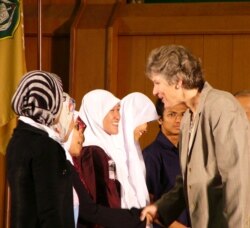 U.S. Undersecretary of State Karen Hughes greets students from the State Islamic University in Jakarta, Indonesia, on October 21, 2005 (official site)
U.S. Undersecretary of State Karen Hughes greets students from the State Islamic University in Jakarta, Indonesia, on October 21, 2005 (official site)
MEET THE NEWSMAKER: Undersecretary of State for Public Diplomacy and Public Affairs KAREN HUGHES has been tasked by U.S. President George W. Bush with leading efforts to promote U.S. values and confront ideological support for terrorism around the world.
She oversees three bureaus at the U.S. State Department: Educational and Cultural Affairs, Public Affairs, and International Information Programs. She also participates in foreign-policy development at the State Department.
A longtime adviser to Bush, Hughes served as counselor to the president for his first 18 months in the White House. As counselor, she was involved in major domestic and foreign-policy issues, led the communications effort in the first year of the war against terrorism, and managed the White House Offices of Communications, Media Affairs, Speechwriting and the Press Secretary.
Hughes returned to Texas in 2002, but continued to serve as an informal advisor to the president and was a communications consultant for his 2004 reelection campaign.
She is the author of "Ten Minutes From Normal," the story of her experiences working for Bush, and she helped write the president’s autobiography, "A Charge To Keep"....(more)
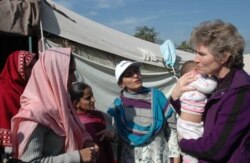 Karen Hughes on November 14, 2005, speaks to Pakistani women who were left homeless by an earthquake in that country in October 2005 (official site)
Karen Hughes on November 14, 2005, speaks to Pakistani women who were left homeless by an earthquake in that country in October 2005 (official site)
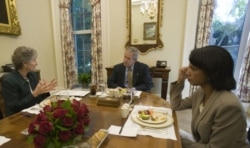 Karen Hughes (left) having a working lunch with President George W. Bush (center) and Secretary of State Condoleeza Rice in the White House on October 5, 2005 (official site)
Karen Hughes (left) having a working lunch with President George W. Bush (center) and Secretary of State Condoleeza Rice in the White House on October 5, 2005 (official site)
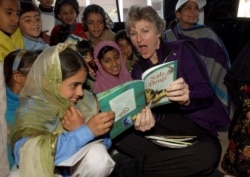 Hughes (right) reads a book with Kashmiri earthquake survivors during a visit to a tent school in Muzaffarabad on November 14, 2005 (official site)
Hughes (right) reads a book with Kashmiri earthquake survivors during a visit to a tent school in Muzaffarabad on November 14, 2005 (official site)
RELATED ARTICLES
Karen Hughes Asks Religious Groups To Battle Terrorism
Hughes Vows To Invigorate U.S. Public Diplomacy Efforts
Hughes To Shape Policy With Public Image In Mind

THE COMPLETE STORY: A complete archive of RFE/RL's coverage of the global war on terrorism.




